Interview with Johanna Ernst

 1 / 8
1 / 8 Heiko Wilhelm
Heiko Wilhelm
Johanna, we got to know you in 2008 and 2009, when you were pretty much the "Mozart" of competition climbing, having won two overall World Cups, the World Championship, the European Championship and a Rock Master in just two years.
But in 2010 you suffered an ankle injury during one of the first World Cup bouldering stages and the rest of the year was called off. By last year, how much had you managed to recover?
Last year I actually injured my other foot, but it was OK, not as bad. It was fine, but this year is way better.
How did the time off from competitions affect you? Did it change your motivation, your desire to compete?
Of course, it was like starting again, almost from zero. I had a long break and then I was so weak. It was really hard work to get back to the level I was at, sometimes it was really discouraging. But when I saw that I was improving and it was much better, I could see myself moving forward.
And the results finally came this season; you got a third place at the World Championships and finished third overall in the World Cup (with one World Cup win at Xining). Is this what you expected given the re-training and the rehabilitation period?
Not really, I didn't expect I could be this good already. I don't know how, but it worked really well for me, it was a nice surprise.
Do you think routes have chaned a bit compared to 3-4 years ago? They seemed a bit more discontinuous then, I remember certain moves took a long time to figure out. Today maybe they're a bit more about fitness?
Yes, there has been a change. It feels like route setters want us to try harder and not just climb until the end and maybe fall off a strange move. They're increasingly trying to set moves that are more spectacular, more powerful.
Do you think these changes are influenced by the bid to make climbing an Olympic sport?
Yes and I have to say I don't like the new rule which uses time as a tie breaker (if the countback is equal). This now means that if two people have performed the same in the previous rounds and are tied in the final, the one that climbed the final route faster is the winner. Which is bad because you can't really concentrate on climbing, you always have time, time, time on your mind and you just tell yourself "keep on climbing".
Did you prefer the superfinal as a tie breaker?
Yes, I did.
Has your style of climbing changde as a result of the injury and the re-training?
A little, I guess, because I couldn't train for bouldering that well, I was afraid of bad falls. I think my style has become a bit more cautious, I try to think more about what to do and am less impulsive, relying less on power and long moves.
That's a shame as I know that you like the social component of bouldering, the fact that you can train with friends and you are not up on the wall alone. Do you think you are going to try bouldering competitions again?
No, not really. Maybe in ten years time or something, but not at the moment. The fear of a bad fall is still in my head, but I'm trying really hard to get used to it again.
What would you say are your strengths, what are the weapons you know you can count on?
I think I have a strong mind, it makes me climb really well, I know I can handle stress well, in isolation and on the route. In competitions I actually climb way better than in training. Once, I tried to re-climb a competition route and I couldn't do it at all, whilst during the event I had done it easily.
That says a lot about your mental strength really. It's just like your father said after you topped the final route in Kranj in 2008: "An Ernst never gives up!"
Yes, that's right! (laughs)
This strong mindset of yours, is it something you train or just a natural trait?
It is something I train. Just like you have to train your body for climbing, you have to train your mind, too. I have a special trainer I train with sometimes. We do particular exercises, like he's trying to influence me in a bad way, telling me I can't do it, and the challenge is to climb on nevertheless and not pay attention to what he's saying. It's really hard but graet fun at the same time.
Now that competitions are a bit easier to follow, with the live webcasts of IFSC TV, beginners have a better chance of seeing top climbers in action. If somebody new to climbing would like to see a good example of technique, who would you recommend they should watch? You can name yourself if you want... ; )
I think it's Jain Kim, it's amazing to see her climb, it's so wonderful. I would also say Mina Markovic, she has a lot of strength and so much power, she's impressive to watch, too. For the boys... Hard to say, I guess I like Sean McColl's style, it's really nice.
Do you think that in the long term the game of climbing outdoors, on rock, might interest you more than competitions?
I mean, in a competition you can't do more than first place, but on rock you could go on virtually forever, there's always a next level to progress to...
I like to climb on rock more than in the gym. But when I climb on rock, it's no competition at all, no training at all. I just want to be outside in nature and relax and enjoy it. And if I do well, I do well, but if I don't it's OK : )
Last question, do you have something planned after the season ends? Maybe some holidays?
I'm going on holidays with a friend, abroad, I'm really excited, I can't wait. This season has been really long.
We wish you all the best then and see you in 2013!
by Franz Schiassi
| Expo.Planetmountain | |
| Expo Salewa | |
| www | |
| www.scarpa.net | |
| www.johanna-ernst.at | |



 Copia link
Copia link






 See all photos
See all photos






















